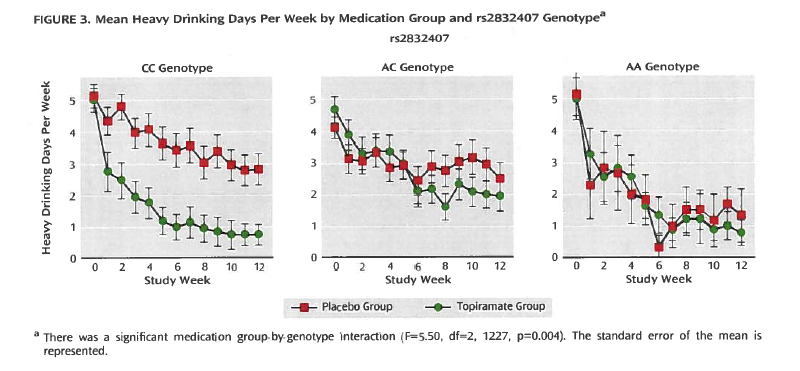Toward Personalized Addiction Medicine: Matching Medications with Genotype
Recovery is often conceptualized as abstinence from alcohol and other drugs, though many individuals wish to cut down their drinking without quitting entirely.
Medications have shown promise in aiding recovery from alcohol use disorders, though abstinence-seeking individuals have been the focus.
One primary drawback of medications are their side effects; those of topiramate (topamax), for example, are well documented including slowed thinking and or confusion.
Studies that identify who is most likely to respond well to medications could help clinicians target certain patients while protecting those who are unlikely to respond to unpleasant side effects and unnecessary cost. The cross-disciplinary nature of modern addiction research, including psychological and biological, and genetic measures, allows for this kind of scientific investigation.
Kranzler and colleagues tested the efficacy of topiramate in a sample of 138 heavy drinkers (most of whom also met the criteria for alcohol dependence), who were interested in reducing drinking from a minimum of 24 or 18 drinks per week to 12 or 8 per week for males and females, respectively. Sixty-seven received 200mg of topiramate daily (treatment group) and 71 received placebo (controls) for 12 weeks – all patients were engaged in psychosocial addiction counseling.
Primary outcomes were self-reported heavy drinking (5 or more drinks for men and 4 or more for women) and abstinent days, validated via liver biomarkers. As in prior work with patients seeking abstinence, the topirimate treatment group had fewer heavy drinking and more abstinent days by end of treatment, and a quicker improvement in outcomes during treatment. The topirimate group was more than five times less likely to drink heavily and more than twice as likely to abstain from drinking by end of treatment.
As in prior work with patients seeking abstinence, the topirimate treatment group had fewer heavy drinking & more abstinent days by end of treatment, a quicker improvement in outcomes during treatment, and was 5x less likely to drink heavily and more than twice as likely to abstain from drinking by end of treatment.
In addition to these important findings, the authors also showed that in a subsample of 122 European Americans (selectively chosen from the original 138 participants due to substantial population differences in the presence of the genetic marker), the medication’s benefit for reductions in heavy drinking days was found to be accounted for primarily by those with a particular allele – the CC allele of the GRIK1 gene – suggesting a “pharmacogenetic” match of topirimate with this genotype.

IN CONTEXT
This compelling study provided additional evidence regarding the benefit of topiramate for individuals with hazardous drinking and with alcohol use disorders, who expressed initial interest in cutting back rather than abstaining completely.
This study shows the potential of personalized addiction treatment, where certain biomarkers, in this case a specific genotype, can predict treatment response.
Genetic characteristics not only appear to predict who will develop a substance use disorder, but also perhaps the course of one’s recovery. If these findings are replicated with further study, this pharmacogenetic match could improve the efficiency, effectiveness, and cost-effectiveness of addiction treatment and reduce iatrogenic effects stemming from unnecessary exposure to topirimate.
CITATIONS
Kranzler, H. R., Covault, J., Feinn, R., Armeli, S., Tennen, H., Arias, A. J., … & Kampman, K. M. (2014). Topiramate treatment for heavy drinkers: moderation by a GRIK1 polymorphism. American Journal of Psychiatry, 171(4), 445-452.

